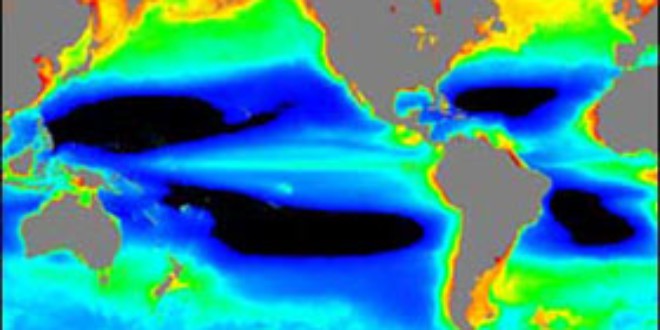
A new study says the world’s oceans will likely lose about one-sixth of its fish and other marine life by the end of the century if climate change continues on its current path.
Much of the world relies on the oceans for food or livelihood, scientists say.
The comprehensive computer-based study by an international team of marine biologists found that for every degree Celsius (1.8 degrees Fahrenheit) that the world’s oceans warm, the total mass of sea animals is projected to drop by 5%.
If the world’s greenhouse gas emissions stay at the present rate, that means a 17% loss of biomass — the total weight of all the marine animal life — by the year 2100, according to Tuesday’s study in the Proceedings of the National Academy of Sciences.
But if the world reduces carbon pollution, losses can be limited to only about 5%, the study said.
“We will see a large decrease in the biomass of the oceans,” if the world doesn’t slow climate change, said study co-author William Cheung, a marine ecologist at the University of British Columbia. “There are already changes that have been observed.”
While warmer water is the biggest factor, climate change also produces oceans that are more acidic and have less oxygen, which also harms sea life, Cheung said.
“The potential ramifications of these predicted losses are huge, not just for ocean biodiversity, but because people around the world rely on ocean resources,” said University of Victoria biology professor Julia Baum, who wasn’t part of the study but says it makes sense. “Climate change has the potential to cause serious new conflicts over ocean resource use and global food security, particularly as human population continues to grow this century.”
The biggest animals in the oceans are going to be hit hardest, said study co-author Derek Tittensor, a marine ecologist at the United Nations World Conservation Monitoring Center in England.
“The good news here is that the main building blocks of marine life, plankton and bacteria may decline less heavily, the bad news is that those marine animals that we use directly, and care about most deeply, are predicted to suffer the most as climate change is working its way up the food chain,” co-author Boris Worm, a marine biologist at Dalhousie University in Canada, said in an email.
Tropical areas, already warm, will also see the biggest losses, Cheung said.
Scientists had already thought that climate change will likely reduce future ocean life, but past computer simulations looked at only part of the picture or used only one model. This study uses six different state-of-the-art computer models that give the best big picture look yet, Cheung said.
It is hard to separate past climate change impacts from those of fishing, but past studies have shown places where observed fish loss can be attributed to human-caused climate change, Chung added.
Tittensor pointed to lobsters off Maine and North Atlantic right whales as examples of creatures already being hurt by global warming hitting the ocean.
University of Georgia marine biologist Samantha Joye, who wasn’t part of the research, praised the study as meticulous and said it is also “an urgent call for action.”
“Healthy oceans are required for planetary stability,” Joye said in an email. “Aggressive global action to slow climate change is a moral imperative.”
Sea creatures getting wiped out twice as fast by global warming
An earlier study found:
Global warming has caused twice as many ocean-dwelling species as land-dwelling species to disappear from their habitats, highlighting the exceptional vulnerability of sea species that have no refuge from the rising heat.
The study, published in April 2019 in the journal Nature, is the first of its kind to compare sensitivity to warmer temperatures in cold-blooded animals that live in the world’s oceans versus those that live on land.
The results surprised the study’s lead author, Malin Pinsky, an associate professor in the Department of Ecology, Evolution, and Natural Resources at Rutgers University–New Brunswick.
“Ten years ago there actually wasn’t much attention to the impact of climate change on marine animals and today we are finding that they might be the most vulnerable of all species on earth,” Pinsky told weather.com.
Pinsky and his fellow researchers combed through available data on 88 cold-blooded marine species and 294 cold-blooded land species, ranging from lizards to fish to spiders. They developed a method to calculate the animals’ body temperatures and looked at climate and weather data surrounding the animals’ habitats to reach their conclusions.
“There were two key pieces,” Pinsky said. “One was understanding the highest temperatures that the animals could tolerate and the other was figuring out how much they heat up.”
He noted that the study looked at climate data over the past 20 years, meaning it provides a real-time picture of how sea creatures are affected by global warming.
“Not only are they more vulnerable but we are actually seeing this vulnerability play out around us right now,” Pinsky said.
The study also noted that many land animals can hide from heat in forests, shaded areas or underground. Most animals living in the ocean don’t have those same protections.
Pinsky said understanding global warming’s impact on the oceans and the animals that live in them is crucial to future conservation efforts and pinpointing where best to focus those resources.
“There’s actually a lot we can do to reduce these impacts,” he said. “Reducing greenhouse gas emission is really the most important thing we can do.”
He added that, even at the local level, efforts to stop overfishing, limit destruction of habitat and setting up marine conservation areas are also important steps to preserving marine life.
Pinsky also pointed out that not only are sea creatures an important part of nature, they are also a primary food source for many people and provide jobs for people who fish and harvest them.
“We’re all tied to the ocean whether we realize it or not,” he said. “These changes touch all of us.”











































